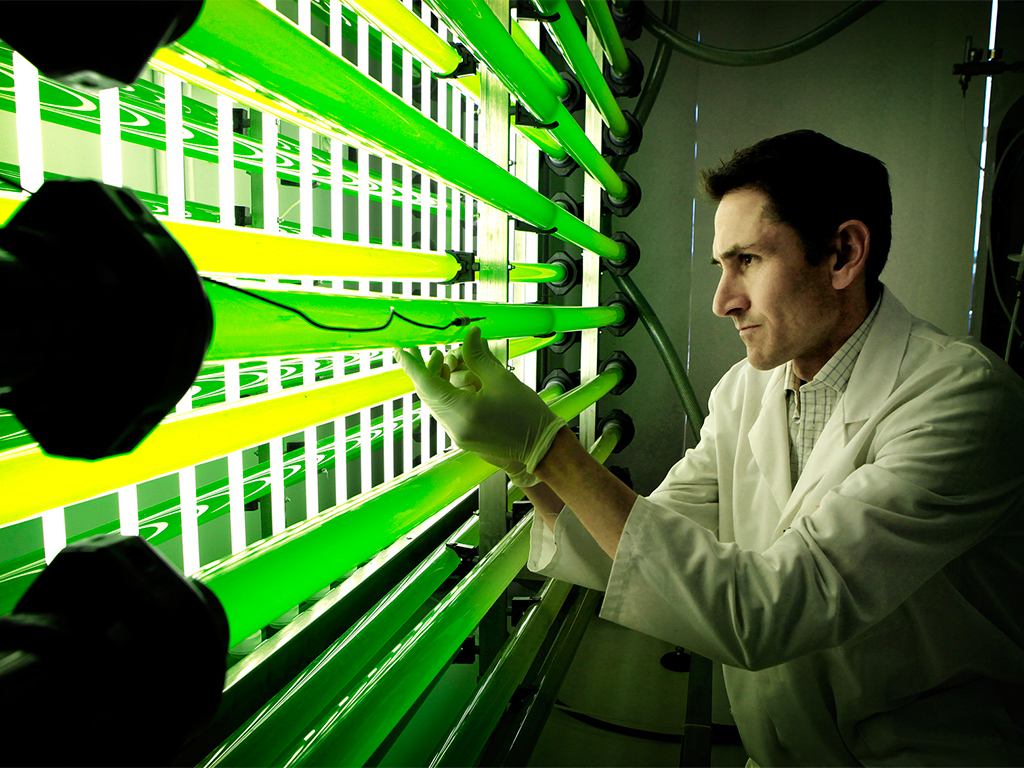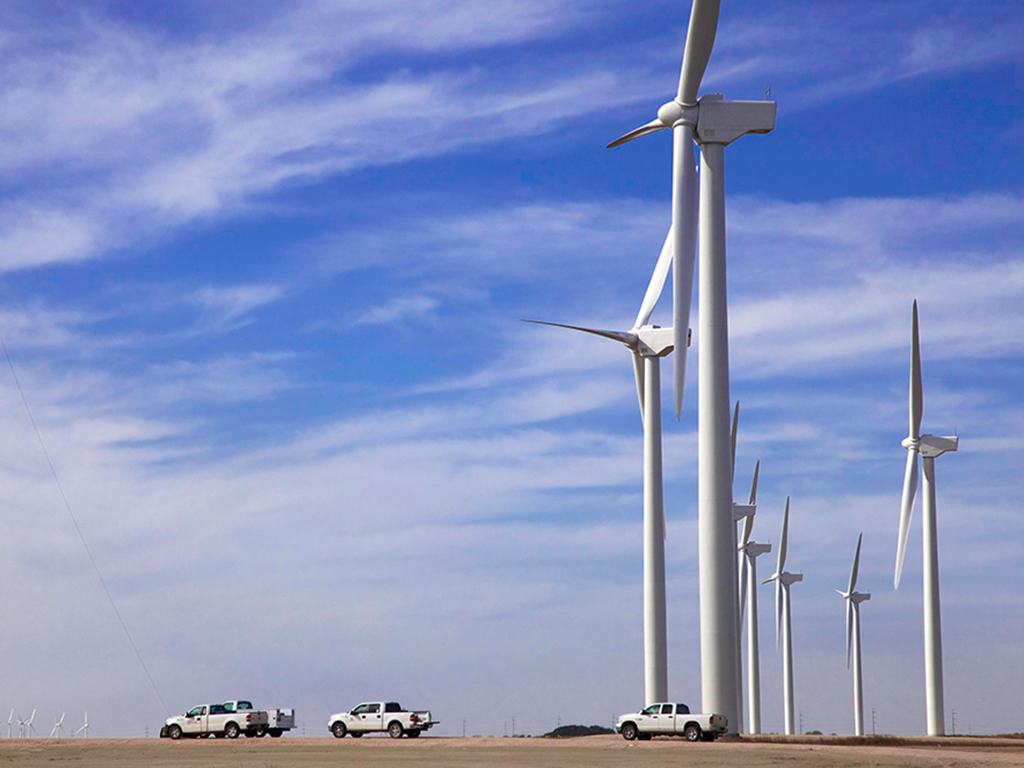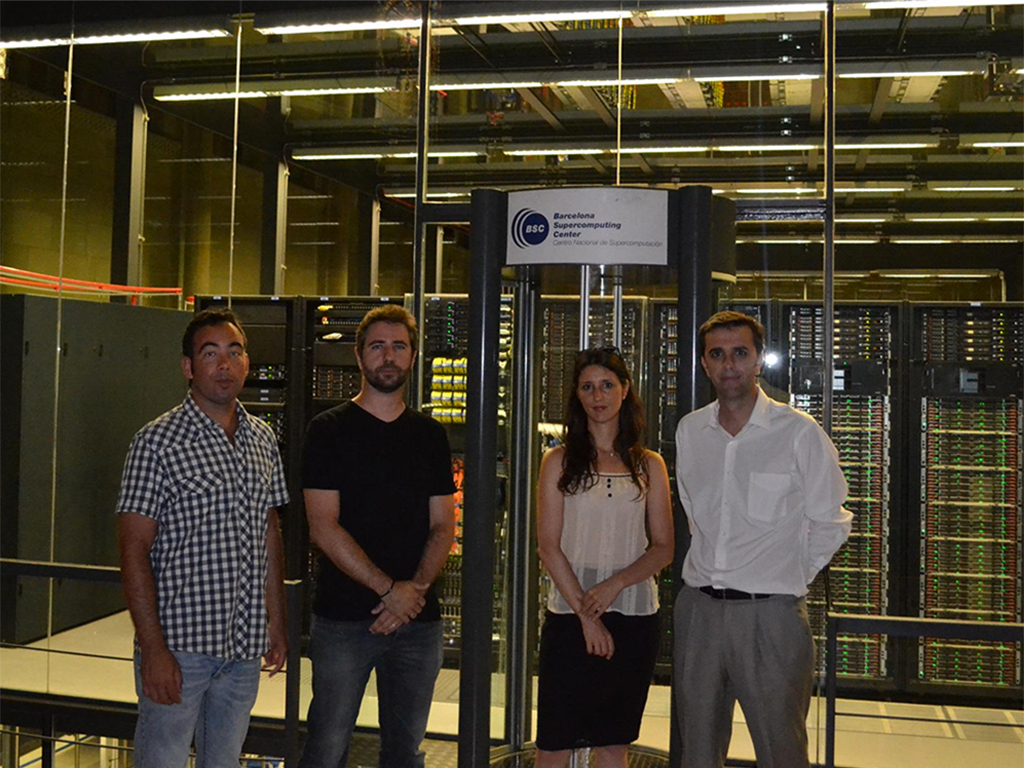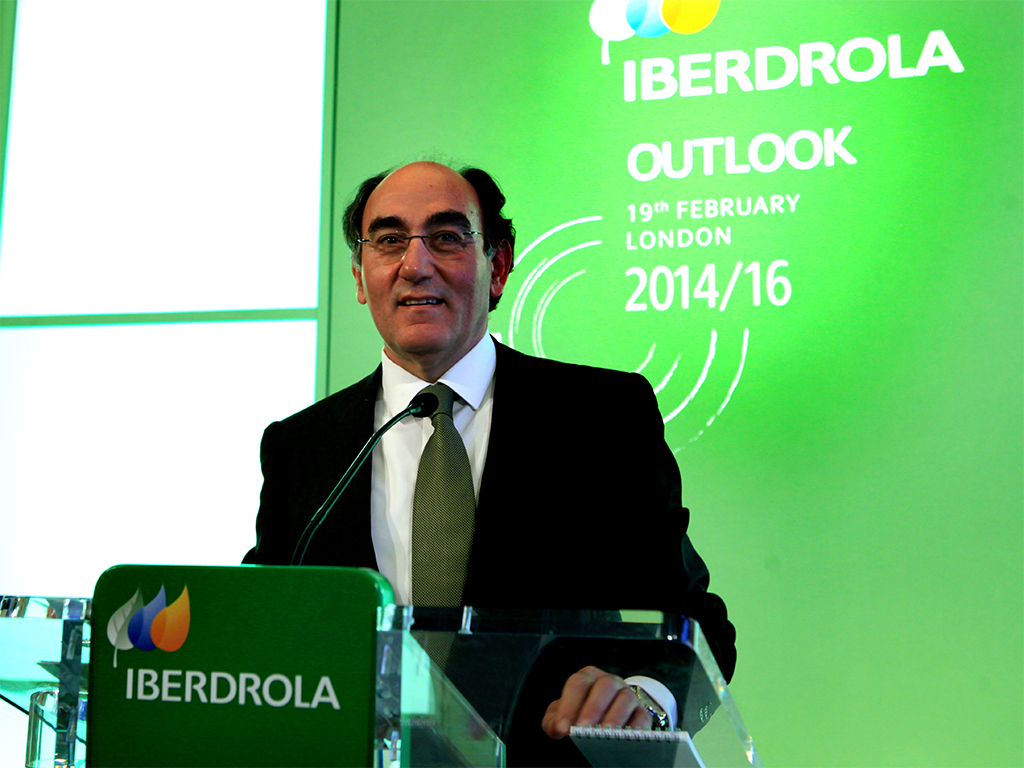Technological advances in renewable energy
Spanish energy giant Iberdrola has been making great leaps when it comes to technological advances in renewable energy – in order to fuel the world in a more sustainable manner

A glimpse into Iberdrola’s Cenit Vida Project. Scientists have developed methods to capture C02 from pollutant smoke, which can then be used to grow microalgae. Image: Imágenes de Iberdrola
The enthusiasm for renewable forms of energy has taken something of a battering in recent years, with government subsidies being cut back and investor sentiment going lukewarm. The widely held opinion is that there needs to be a wave of technological advances in the renewable energy sector for the industry to get back on track.
[T]here needs to be a wave of technological advances in the renewable energy sector for the industry to get back
on track
From solar farms to onshore and offshore wind, governments in many developed countries have scaled back many of their more ambitious renewable energy projects, in favour of more trustworthy – if more polluting – fossil fuels.
However, there is a stark need for sustainable sources of energy to emerge over the coming decade, not least in the developing parts of the world that lack the natural resources found elsewhere. Throughout Africa there is a desperate need for energy to power the economies of many countries that have been hampered by overly expensive oil and gas imports and a lack of modern infrastructure to use them efficiently.
Due to the typical high cost that comes with making technological advances in renewable energy, there has been little headway by the industry in the continent. Things look to be changing, however, with a number of investments in recent years that could see renewable energy take off across Africa.
Kenya, for example, has quickly become one of Africa’s most active countries for utilising renewable energy sources. With almost no investment in the industry in 2009, as much as $1.3bn was pumped into a number of renewable energy technologies in 2010, and several companies are making strides towards advancing technology in this country.
Iberdrola: at the forefront technological advances in renewable energy

Iberdrola and Gamesa have recently signed an agreement to expand the Peñascal wind farm complex in the United States. The project will become Iberdrola’s largest renewable energy facility globally. Image: Imágenes de Iberdrola
One firm pioneering technological advances in renewable energy in Kenya is Spain’s largest energy group, Iberdrola. Thanks to a strong and rapid process of internalisation, Iberdrola is now one of the five largest European electric companies by stock market capitalisation and supplies energy to 120m people.
Iberdrola – key stats
€92.5bn
Total assets
30,000
Employees
Headquartered in Bilbao, the last decade has seen the firm rapidly expand its operations around the world, and it has grown to have total assets worth €92.5bn and more than 30,000 employees. Subsidiaries of the firm include Scottish Power, Iberdrola USA and Brazil’s Elektro, and the company’s largest shareholder is the Qatar Investment Holding group.
Its core businesses revolve around power generation, gas and electricity supply, with a combined installed capacity of over 45,000MW worldwide, with a balanced, efficient, and well-diversified generation portfolio that assures its ability to respond to any energy situation.
Its decisive and pioneering commitment to the development of renewable energy, especially wind power, the use of cleaner generating technologies, and respect for the environment, have been one of the central pillars of Iberdrola’s growth over the last 10 years, as well as one of the key factors of the group’s strong international expansion. Iberdrola is currently the world leader in renewable energy, an industry in which it already has an installed capacity of nearly 14,250MW.
Iberdrola is noted for its commitment to sustainability, and was recognised on the Dow Jones Sustainability Index last year, which is the main international benchmark for measuring how companies contribute towards sustainable development, with over 72 percent of its installed capacity and 83 percent of its energy production in Spain emissions free.
Together with a supply chain of more than 15,000 companies, Iberdrola has built and continues to develop clean energy projects throughout the world, becoming an engine for economic growth, particularly in rural areas.
Iberdrola is building the 61MW Kinangop Wind Farm in Kenya, one of the largest wind power generation projects in sub-Saharan Africa, which will generate enough renewable electricity to power 150,000 homes in the country – a great fit for Kenya’s robust wind conditions and for the advancements in serviceability and grid integration. It is also building the Nairobi Ring, a large-scale grid upgrade for the Kenya Electricity Transmission utility, including a high-voltage network, four new substations and the extension of the city’s largest substation.
The future of technological advances in renewable energy
Technological advances in renewable energy are something that firms across the world are investing heavily in. Many firms are convinced that renewable technologies are the future of the energy industry.
Recent research conducted by Harvard University has shown that advances in battery capabilities could lead to renewable energy technologies becoming more efficient and cheaper. The research states that by using new batteries, costs can be reduced and more energy can be stored. Such research is helping to spur enthusiasm in the industry, but private firms are also investing in new technologies.
Iberdrola is investing considerable amounts into technological advances in renewable energy

Scientists working on Iberdrola’s Sedar Project stand by the Barcelona Supercomputing Center. Image: Imágenes de Iberdrola
Iberdrola is investing considerable amounts into technological advances in renewable energy. While it has a dominant position in the onshore wind energy market, it is also looking at offshore wind and marine technology as a way of harnessing sustainable sources of power.
Currently there are a number of marine technology devices being tested that are capable of harnessing the waves and tides from oceans, converting them into electricity and transporting it to land. They include wave and tidal prototypes off the coast of Santoña in Cantabria, Spain and the Orkney Islands in Scotland. Iberdrola plans to use this technology as part of the world’s first tidal turbine array in the Sound of Islay in Scotland.
Offshore wind technology in particular is something Iberdrola is enthusiastic about exploring and investing. January 2014 marked a significant achievement for Iberdrola as first power from the West of Duddon Sands offshore wind farm was generated. The project is being constructed in the Irish Sea and is Iberdrola’s first entry into the offshore wind market, with excellent progress being made to date.
The 389MW project is at the forefront of industry efforts to reduce costs across the sector. Iberdrola’s investment in a £50m bespoke offshore wind terminal at Belfast harbour – with its installation and pre-assembly capabilities – has also paved the way for the construction of future projects. West of Duddon Sands also benefits from having first use of two of the world’s most technologically advanced installations vessels – the Pacific Orca and the Sea Installer, working successfully in tandem to construct foundations and install turbines.
Iberdrola’s commitment to research and development

A scientist demonstrates one of Iberdrola’s most innovative new projects, the Sigma R&D Project, which is aimed at reducing almost 100 percent of the emissions from electricity generation plants and industrial facilities. Image courtesy of Imágenes de Iberdrola
The company’s commitment to research and development is reflected in the amount of money it has invested to finding technological advances in renewable energy – with as many as 150 projects on the go. Much of this focus is on improving the sustainability and reliability of supply of its services, and making all of its operations more efficient. Iberdrola has an Innovation Plan in place for 2012-2014 and plans to invest €450m on reinforcing its technological leadership and creating value across its global subsidiaries, investing in areas that include both traditional and renewable energy, distribution, engineering, IT and telecommunications.
Iberdrola has an Innovation Plan in place for 2012-2014 and plans to invest €450m on reinforcing its technological leadership and creating value across its
global subsidiaries
One of its biggest research initiatives is the SIGMA project, which is a joint scheme with the University of Salamanca to develop revolutionary lasers that will ionise pollutant gases for later use as raw materials.
It is also developing, alongside the Barcelona Supercomputing Center, the SEDAR Project. This will see new software created that will help advance studies in onshore and offshore wind production.
The company has also launched its own technology centre in Qatar, which is dedicated towards developing smart grids. This has been done in conjunction with local electricity company Kahramaa, and will lead to both a feasibility study and a pilot project in the country.
Last year it announced that it was joining forces with Swedish wave energy convertor specialist firm CorPower Ocean and Portuguese marine research centre WavEC to produce high efficiency wave power technology. The €15m HiWave project will look to harness wave power using advanced compact devices which will efficiently generate offshore power. It is hoped that the project will be completed by 2016, which could transform the marine energy industry.
Global energy challenges

Ignacio Galán at Iberdrola’s 2013 Results press conference. Image: Imágenes de Iberdrola
The mix of the global energy market in the future will depend on further technological advances, especially in regards to low carbon energy sources. However, given that the energy sector is extremely intensive in capital, stable and predictable regulatory frameworks will be necessary to incentivise the investments required by these new energy projects.
In Europe, it is becoming increasingly clear that decisions affecting the energy sector are going to be crucial to the success of its economies for years to come
The World Economic Forum’s Energy Utilities Community, chaired by Ignacio Galán since January 2014, has warned on the growing problem of regulatory uncertainty and constantly changing political priorities. This is reflected in new taxation, inconsistent subsidies and other policies that in some cases leave utilities a catch-all for assorted non-energy costs which end up in consumer bills.
Power companies are ready to meet the technological challenge of rapidly developing new technologies, such as smart grids, but policymakers must play their part and solve regulatory inconsistencies.
According to Ignacio Galán, the world energy scenario is in a process of deep transformation. “With world electricity consumption predicted to rise 93 percent between 2010 and 2040, the energy sector must be able to invest not only in large generation projects but also in the required energy infrastructure to transmit the electricity. The International Energy Agency estimates that around 17trn dollars of investment will be needed globally over the next 20 years, both in new transmission and distribution network and also in evolving technologies.
“New plants can only be economically viable if they have a long-term, stable and sufficient remuneration scheme, given the amount of investment they require. The right answer is to bet on the deployment of technologies that are mature enough to provide energy and environmental solutions at a reasonable cost and renewable energy is projected to be the fastest growing source of primary energy over the next decades.”
He added: “Subsidies to fossil fuel industries should stop so we can invest more in the fuels of the future. It also means avoiding massive subsidies for new technologies that are displacing efficient and relatively low carbon sources such as gas. A clear and long-term policy framework to enable investment decisions is required, overseen by a single European regulator to ensure consistency.”
Key achievements

Dancing in the village of Nyumbani in Kenya, where Iberdrola has installed a solar farm that will provide electricity to 1,000 children
Iberdrola plans to adopt the same strategic principles for the 2014-2016 period that have sustained the company through the global economic and financial crisis: a balanced risk profile, financial strength and operating efficiency to achieve sustainable returns for shareholders.
The company will carry out an intensive investment programme between 2014 and 2016 amounting to a net €9.6bn (gross €11.2bn) focused on projects and countries enjoying stable and predictable regulatory frameworks. Of this amount 46 percent (€4.4bn) will be allocated to new infrastructure and the remaining 54 percent (€5.2bn) to maintenance and improvements. In this respect, the largest share of investments will be in the UK with 41 percent, followed by Latin America (nearly 23 percent) with most of this in Mexico, and the United States (17 percent).
It was this year voted as Spain’s best firm for corporate governance
in Spain
The focus towards technological advances in renewable energy and international expansion has driven the firm’s business. Iberdrola has undergone a profound transformation since the beginning of this century, allowing it to become one of the five largest European electricity companies by market capitalisation and the world leader in operating wind energy.
It was this year voted as Spain’s best firm for corporate governance in Spain as a result of its commitment towards sustainability, social responsibility and good practice. Galan told World Finance in February, “Good governance requires a constant effort to communicate governance policies to all you stakeholders. Corporate sustainability and responsibility should be embedded in every aspect of the company’s life. It’s not just about talking but about doing.”
The company’s commitment to social responsibility has seen it start a number of initiatives across Africa, aimed at helping local communities and delivering sustainable energy to them. It installed a solar farm in the village of Nyumbani in Kenya, providing electricity to 1,000 children. Iberdrola is especially committed to delivering technological advances in renewable energy technology, and part of this focus has been to end struggling Kenyan communities’ reliance on expensive fossil fuels.